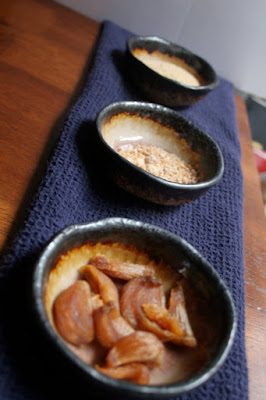Molecular Gastronomy, It's Not Dead Yet!
I hate the molecular gastronomy debate. My real job world has several similar nomenclature debates and the truth is people hate labels, especially when the label is either outgrown, foisted upon them or develops a negative connotation. The Molecular Gastronomy nomenclature debate is pure inside baseball.
The truth is, there really aren't a gazillion restaurants that really fall under the umbrella of this movement... Molecular Gastronomy, Molecular Cuisine, Progressive Cuisine, techno-emotional, Spanish avant-garde, call it what you will. The idea that this is a tremendous movement is really something perpetuated by the culinary zeitgeist. Don't get me wrong, this is a movement that exists, and inside of that movement are a good number of chefs and restaurants that execute to varying levels of success. But, the reason it is talked about so frequently is because it makes for an interesting story. Interesting stories get read. As a result, people start to think about archetypical Modernist restaurants that look like science labs and no one does any traditional cooking. And, lets face it, some chefs played into that image.
But if the culinary zeitgeist is going to fill you with its hot air, rest assured it is only so it can slap a Hindenburg sticker on you and set you on fire.
Bob Del Grosso writes at one of my favorite blogs, A Hunger Artist. In a recent post, "A Failure To Thrive", he agrees with the implications of a WSJ article, that questions if Molecular Cuisine is on the decline. There are a number of great observations in there, including this quote on Modernism's influence on cooking relative to Nouvelle Cuisine:
My one word response is: Yet!
My one graf response is: It is too early to tell. In my opinion, we are still at the beginning phases of the use of these modern techniques and ingredients in kitchens. I know people will argue and tell me how long these techniques have existed for, but in truth, they have only recently become popular and accessible. You still really have to seek this stuff out.
As to whether or not this movement is dead? Well, if the writing is on the wall, we'll start to see changed in the lists of top restaurants. Last I checked, they contained a disproportionately high number of Modernist restaurants compared to say French restaurants.
I think what the Modernist movement faces now is really more of an evolution instead of a death. The number of new techniques and ingredients has been slowing down. Innovation is becoming more incremental. As such, more time will be spent digesting, refining and advancing the existing techniques. Long term, these techniques learned will get folded back into the canons of culinary knowledge. More and more restaurants will use them in increasingly subtle ways. Ultimately, I think a some of them, most notably sous vide, will be used in kitchens the same way braising, boiling and frying are today.
The truth is, there really aren't a gazillion restaurants that really fall under the umbrella of this movement... Molecular Gastronomy, Molecular Cuisine, Progressive Cuisine, techno-emotional, Spanish avant-garde, call it what you will. The idea that this is a tremendous movement is really something perpetuated by the culinary zeitgeist. Don't get me wrong, this is a movement that exists, and inside of that movement are a good number of chefs and restaurants that execute to varying levels of success. But, the reason it is talked about so frequently is because it makes for an interesting story. Interesting stories get read. As a result, people start to think about archetypical Modernist restaurants that look like science labs and no one does any traditional cooking. And, lets face it, some chefs played into that image.
But if the culinary zeitgeist is going to fill you with its hot air, rest assured it is only so it can slap a Hindenburg sticker on you and set you on fire.
Bob Del Grosso writes at one of my favorite blogs, A Hunger Artist. In a recent post, "A Failure To Thrive", he agrees with the implications of a WSJ article, that questions if Molecular Cuisine is on the decline. There are a number of great observations in there, including this quote on Modernism's influence on cooking relative to Nouvelle Cuisine:
However, even though it represents an even more radical change than nouvelle cuisine, it is not as revolutionary in the sense that it has not caused a fundamental change in the way that most chefs cook.
My one word response is: Yet!
My one graf response is: It is too early to tell. In my opinion, we are still at the beginning phases of the use of these modern techniques and ingredients in kitchens. I know people will argue and tell me how long these techniques have existed for, but in truth, they have only recently become popular and accessible. You still really have to seek this stuff out.
As to whether or not this movement is dead? Well, if the writing is on the wall, we'll start to see changed in the lists of top restaurants. Last I checked, they contained a disproportionately high number of Modernist restaurants compared to say French restaurants.
I think what the Modernist movement faces now is really more of an evolution instead of a death. The number of new techniques and ingredients has been slowing down. Innovation is becoming more incremental. As such, more time will be spent digesting, refining and advancing the existing techniques. Long term, these techniques learned will get folded back into the canons of culinary knowledge. More and more restaurants will use them in increasingly subtle ways. Ultimately, I think a some of them, most notably sous vide, will be used in kitchens the same way braising, boiling and frying are today.



Comments
Post a Comment